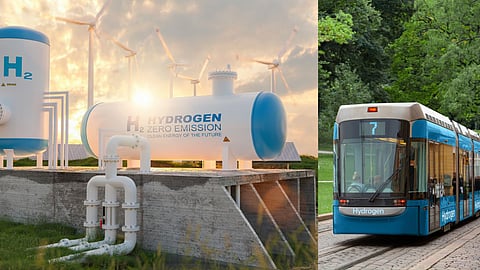

The first hydrogen-fuelled train is set to undergo trial runs on the Jind-Sonipat heritage line in Haryana this December. What makes this project especially noteworthy is the pivotal role played by a Malayali innovator, Thomas Joseph, whose company, Fluitron, has developed the crucial hydrogen compression and dispensing technology that will power these trains.
Thomas Joseph, a native of Puthuppally in Kottayam, Kerala, has been working in the hydrogen fuel industry in the United States for over 20 years. As the Chief Innovation Officer of Fluitron, he has led the development of systems to store hydrogen under high pressure, a key technology that will ensure the safe and efficient fuelling of these hydrogen trains. Fluitron, based in the US, has set up a manufacturing facility in Coimbatore, Tamil Nadu, where it has developed the compression and dispensing systems for the hydrogen-fuelled trains.
The hydrogen-powered train, which is expected to be a major leap for India's railways, will be a part of the country’s efforts to reduce carbon emissions and improve sustainability. The fuel cells in the train, where hydrogen reacts with oxygen to produce electricity, ensure that the train runs without emitting harmful pollutants, unlike the conventional diesel engines. Instead, the only byproduct is steam, making the train eco-friendly and a vital step towards Indian Railway's goal of achieving net zero carbon emissions by 2030.
The hydrogen train will run on heritage and hilly routes, replacing traditional diesel trains. This shift is expected to save on the high costs of electrification while contributing to reducing noise and carbon pollution. The trial run will take place on the 90-km Jind-Sonipat line in Haryana, and if the trials prove to be successful, 35 hydrogen trains are expected to be operational across India by 2025.
The train, manufactured at the Integral Coach Factory in Tamil Nadu, is designed with six bogies, each equipped with 100 kW fuel cells. The hydrogen fuel required for the train will be supplied by private companies, with plants being set up for hydrogen production and storage in collaboration with private partners. One of the first hydrogen filling plants will be installed near Jind railway station in Haryana to support the first hydrogen train.
India will become the fifth country in the world to have hydrogen-powered trains, joining Germany, Sweden, Japan, and China in this advanced clean energy initiative. The construction of the hydrogen train itself has cost Rs 80 crore, with Rs 70 crore allocated for upgrading the Jind-Sonipat line to accommodate the new technology.
The Indian Railways aims to replace its diesel and DEMU trains with hydrogen-powered alternatives as part of a broader commitment to reducing its carbon footprint and supporting global efforts to combat climate change. The success of this project could position India as a leader in the adoption of clean energy technologies in the transport sector, with the expertise of Malayali innovators like Thomas Joseph helping to drive the change.